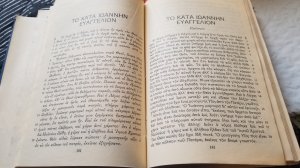- Apr 14, 2019
- 1,439
- 819
- Country
- United States
- Faith
- Christian
- Marital Status
- Single
Figured this might be a good place to ask this. It's my understanding that unlike English, where if you go back to just the year 1000 you basically find a different language, Koine/Biblical Greek is actually reasonably comprehensible to a modern Greek speaker, though obviously not as much as actual modern Greek is.
I know there have been various Bible editions that "translate" the New Testament from Koine to Modern Greek, so I know both original and modern get used by Greek Christians, but I'm not sure which is used more. Anyone know?
As long as I'm at it, I might as well ask about the Old Testament. Does the Septuagint get much use nowadays or is usage of that just limited to scholars, with pretty much everyone else using translations of the Hebrew into Modern Greek?
I know there have been various Bible editions that "translate" the New Testament from Koine to Modern Greek, so I know both original and modern get used by Greek Christians, but I'm not sure which is used more. Anyone know?
As long as I'm at it, I might as well ask about the Old Testament. Does the Septuagint get much use nowadays or is usage of that just limited to scholars, with pretty much everyone else using translations of the Hebrew into Modern Greek?

